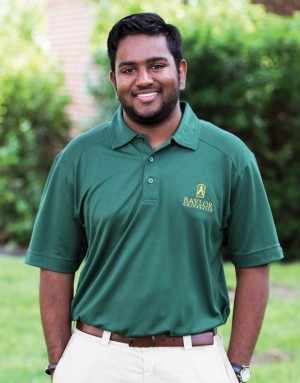
By Shehan Jeyarajah
Sports Writer
I was in the house to cover Baylor playing No. 8 Kansas in Waco on Feb. 4. The Jayhawks are a team that always gets a reaction from fans, and it was no different that day.
With their team trailing, the Baylor student section turned their chants to projected NBA lottery pick Joel Embiid, who was having an off night.
Kansas went on a run to push its lead well into double-figures, and Embiid looked to the student section and gave them a wink. When Embiid finally scored his first field goal on an and-one layup, Kansas sophomore Jamari Traylor put his finger on his lips to shush the home crowd. That got him chants of “You’re on the bench” from the Baylor students.
Interactions like these make college basketball fun. The sport is unique in the level of access fans have to the players.
Fans are only a few feet away from the court and can have direct impact on games with their cheers and taunts.
While it needs to a be a priority to keep passionate fans involved, the NCAA needs to make a concerted effort to ensure these interactions don’t cross the line and become offensive or threatening.
On Saturday night in a loss to Texas Tech, Oklahoma State star Marcus Smart went into the stands and confronted a Texas Tech supporter.
He shoved the fan and was grabbed by teammates and assessed a technical foul before being removed from the game by Oklahoma State coach Travis Ford.
In a situation like this, it’s a process to learn the facts. We know Smart went into the crowd and shoved a fan. We also know that we have never seen Smart react to a fan like that during his time in the public light.
While Smart could be described as a hothead and emotional player, nothing has given the indication he is an idiot; he must have heard something.
Former Oklahoma State and NBA player Desmond Mason was interviewed on ESPN’s SportsCenter on Sunday morning to discuss the Smart incident. Mason said that when he played in Lubbock as a member of the Cowboys, racial slurs were thrown around by Texas Tech fans on a regular basis.
NBA player John Lucas III mentioned on Twitter that he remembers the specific fan Smart pushed would say crazy things to student-athletes when Lucas was a student-athlete at the beginning of the decade.
Dealing with opposing fans and hecklers is an essential part of being an athlete, but athletes have a right to protect themselves when they feel threatened.
We don’t know exactly what was said to Smart. We can hear speculation and reports, but the only people who know what was said are the fan and Smart.
But from what we have heard around the league, Lubbock has a reputation.
The pride and passion of both fans and players is what we love about college basketball, but fans have to be responsible too.
The Tech fan paid big money for his season tickets, but buying tickets is not a get-out-of-jail-free speech card.
A 50-something-year-old man does not have the right to say whatever he wants to a student-athlete less than half his age.
There is really no precedent in college basketball, but the NBA has taken a hard line stance against players crossing into the crowd. In 2004 during a game against the Detroit Pistons, then Indiana Pacer Ron Artest went into the stands and punched a fan who threw a beer at him.
For the offense, Artest was suspended for 72 games, killing the championship hopes of an elite Indiana Pacers team.
The difference between Artest and Smart?
Artest was a 24-year-old man making more than $5 million to play at a professional level. Smart is a 19-year-old kid being compensated with a college education. They should be held to different standards.
Smart deserves the three-game suspension he got. He should have been ejected from the end of the Tech game too without question. Having him on the court while Tech fans rushed the court is irresponsible and potentially dangerous.
But while Smart’s actions are reprehensible, Texas Tech, along with every school, needs to take a look at its athletics’ fans to ensure that basketball games don’t cross the line.
Shehan Jeyarajah is a sophomore political science major from Coppell. He is a sports writer for the Lariat.



